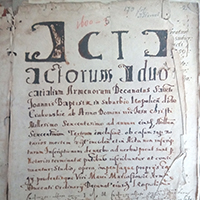
Dr. Ewa Grin-Piszczek from the State Archive in Przemyśl, whose interesting article on the resources of that archive relating to the history of Polish Armenians will appear in the latest edition of Lehahayer (2020), has also sent us news of a valuable manuscript book of the Armenian law court of the jurydyka of St. John’s outside the walls of the city of Lviv [In the Poland of the fifteenth-eighteenth centuries, jurydyka denoted an area within a city or in its immediate vicinity excluded from the jurisdiction of the town authorities].
The inhabitants of this jurydyka were transferred from Ruthenian to Armenian law in 1415 by a decree of King Władysław Jagiełło. From then on, they had their own alderman (Armenian) and court, consisting of two Armenian jurors, two Polish jurors (Catholic) and one Ruthenian juror (Orthodox). The court books of the jurydyka were kept mainly in Latin, sometimes there were some Kipchak entries, later the court notaries used Polish. The first surviving book begins in 1537, the last known book ends in 1817, quite a few years after the Austrian authorities liquidated the Armenian community and court in the city of Lviv itself.
The books of St. John’s jurydyka are a very valuable and unexplored source for the history of the Armenians of the suburb, who lived under different social, economic and legal conditions than the Armenians of Lviv, in an ethnically mixed community, but united by Armenian law. Today, these books are very scattered. Individual volumes can be found in various archives and libraries in Poland and Ukraine. The oldest one is held by the Ossolineum in Wrocław, others are kept in the Central State Historical Archive of Ukraine in Lviv, the National Library in Warsaw and one, dating from 1600-1605, in the State Archive in Przemyśl. Of the latter ‒ entitled Acta actorum ab anno salutis humane MDC ad annum MDCIII exclusive in perpetuum rei memoriam studio opera impensa egregis prudentisque viri Marci Matiasovic Armenii advocati […] inserta in hoc volumine compaginata ‒ Dr. Grin-Piszczek writes:
‘Initially, this book was in the Library of the Greek Catholic Chapter in Przemyśl (it appears in an inventory of the library’s book collection from 1858, which has survived to the present day, drawn up by Father Antoni Petruszewicz). After the book collection of the Greek Catholic Chapter Library was transferred to the National Library (following the liquidation of the Greek Catholic bishopric in 1946), the book went to the Central Historical Archive and from there it was transferred back to Przemyśl in 1953. [This] archival specimen is currently designated with the number 490 in the group “Greek Catholic Chapter in Przemyśl”. The book, consisting of one-hundred-and-seventy-seven leaves, also contains a loose page with entries from 1639.’
It was written by an Armenian alderman, Marek Matiaszowicz, father-in-law of Archbishop Mikołaj Torosowicz’s brother, thus relieving from duty the notary who, having died, was unable to handle the task. During the time of his predecessor, alderman Holub Hrehorowicz, the following sat as jurors in the jurydyka court: Antoni Hołubkowicz and Daniel Szymkowicz (from among the Armenians), Jan, the silk-maker, and Tomasz, the ropemaker (Catholics), as well as Mikołaj Zbaraski, the furrier (Ruthenian). The notary was Kaspar Tymbarski. An annotation in Kipchak dated 1654 appears on the first page of the book.
As an aside to this information, it is worth adding that the name of one of the Armenian families of Lviv, Antibiński, which appears in sources from the seventeenth century and eighteenth century, testifies to its origins in the St. John’s jurydyka. At first it probably sounded like: Jantibiński, which meant: ‘from under John’, since the Kipchak word ‘tibina’ translates as ‘under’. However, the most famous family originating from the jurydyka was undoubtedly the Augustynowicz family, two of whom served as Armenian archbishops. Their ancestor was Aksanty (Augustyn) Jurkowic Owakowicz, an alderman of St. John’s (1541/1542). Having married the daughter of the elder of the Armenian community in Lviv, he applied for Lviv citizenship (1542) and lived in a tenement house at the Armenian cemetery. In the jurydyka he married off one of his daughters, to the juror Daniel Szymkowicz, who is mentioned in the Przemyśl register.

